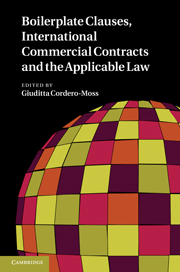Book contents
- Frontmatter
- Contents
- List of contributors
- Preface
- Introduction
- PART 1 How contracts are written in practice
- PART 2 Methodological challenges
- PART 3 The applicable law's effects on boilerplate clauses
- Introduction to Part 3
- 7 The common law tradition: application of boilerplate clauses under English law
- 8 The Germanic tradition: application of boilerplate clauses under German law
- 9 The Romanistic tradition: application of boilerplate clauses under French law
- 10 The Romanistic tradition: application of boilerplate clauses under Italian law
- 11 The Nordic tradition: application of boilerplate clauses under Danish law
- 12 The Nordic tradition: application of boilerplate clauses under Finnish Law
- 13 The Nordic tradition: application of boilerplate clauses under Norwegian law
- 14 The Nordic tradition: application of boilerplate clauses under Swedish law
- 15 The East European tradition: application of boilerplate clauses under Hungarian law
- 16 The East European tradition: application of boilerplate clauses under Russian law
- Conclusion: the self-sufficient contract, uniformly interpreted on the basis of its own terms: an illusion, but not fully useless
- Bibliography
- Index
13 - The Nordic tradition: application of boilerplate clauses under Norwegian law
from PART 3 - The applicable law's effects on boilerplate clauses
Published online by Cambridge University Press: 11 April 2011
- Frontmatter
- Contents
- List of contributors
- Preface
- Introduction
- PART 1 How contracts are written in practice
- PART 2 Methodological challenges
- PART 3 The applicable law's effects on boilerplate clauses
- Introduction to Part 3
- 7 The common law tradition: application of boilerplate clauses under English law
- 8 The Germanic tradition: application of boilerplate clauses under German law
- 9 The Romanistic tradition: application of boilerplate clauses under French law
- 10 The Romanistic tradition: application of boilerplate clauses under Italian law
- 11 The Nordic tradition: application of boilerplate clauses under Danish law
- 12 The Nordic tradition: application of boilerplate clauses under Finnish Law
- 13 The Nordic tradition: application of boilerplate clauses under Norwegian law
- 14 The Nordic tradition: application of boilerplate clauses under Swedish law
- 15 The East European tradition: application of boilerplate clauses under Hungarian law
- 16 The East European tradition: application of boilerplate clauses under Russian law
- Conclusion: the self-sufficient contract, uniformly interpreted on the basis of its own terms: an illusion, but not fully useless
- Bibliography
- Index
Summary
The Scandinavian law of obligations – and of contracts – is a part of the law with old traditions
From a Norwegian perspective, a modern law of obligations and of contracts was launched in the early 1850s, with the publication of a textbook incorporating the existing statutes and court decisions. By the 1870s, the law of obligations was a well-established discipline, both academically and in legal practice. The law of obligations was strengthened at the same time by the establishment on a governmental level of Scandinavian cooperation on legislation in the field of the law of obligations. One of the best known fruits of this is the joint Scandinavian Sales of Goods Act (1905–1907). It was not, however, a wholly Scandinavian invention, but was to a large extent a pragmatic simplification of concepts from English, French and German law. It can be noted that this pragmatic legislation was one of the cornerstones for CISG; it was very familiar to Ernst Rabel, who had initiated the publication of a German version of Tore Almén's extensive commentary on the Sales of Goods Act.
Thus, Scandinavian law has long been regarded as a separate entity from English, French and German law, a law family of its own. The law of contracts is the main core of Scandinavian private law, and textbooks and court decisions from one of the countries is regarded more or less as on the same level as internal sources of law.
- Type
- Chapter
- Information
- Publisher: Cambridge University PressPrint publication year: 2011



